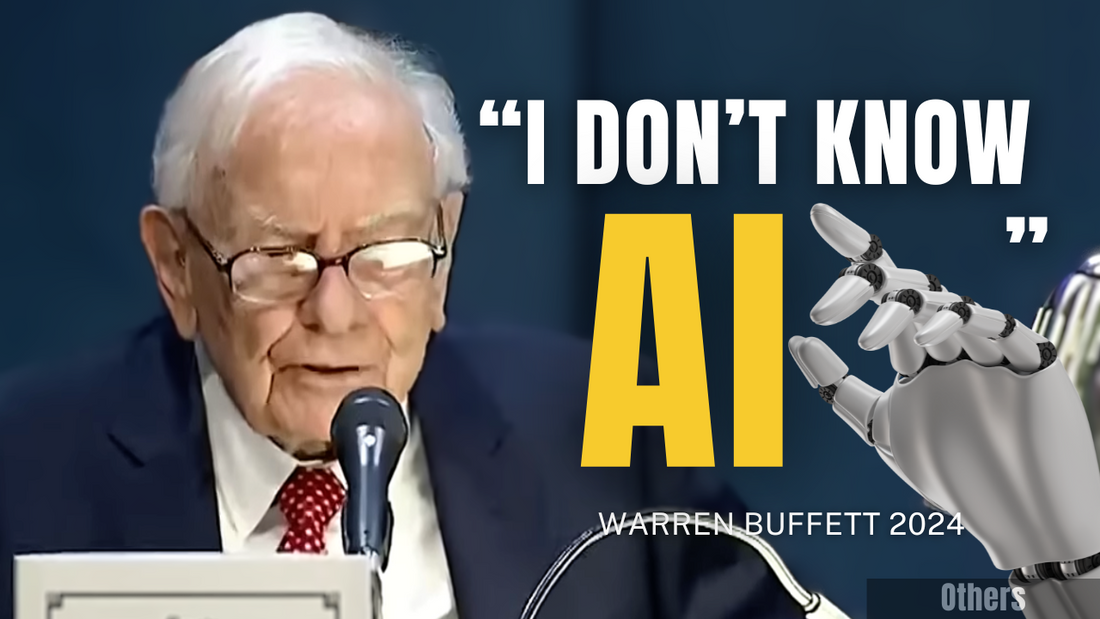
Warren Buffett on AI: “I Really Don’t Know Anything About It” | Berkshire 2024
[Transcript]
AUDIENCE MEMBER: Good afternoon. My name is Caroline, and I'm a lawyer in San Diego —
WARREN BUFFETT: I’m already in trouble!
AUDIENCE MEMBER: — but please don’t hold that against me. (Laughs) Remember, Mr. Munger was once an attorney, too.
WARREN BUFFETT: Right.
AUDIENCE MEMBER: First, I'd like to sincerely thank you, Mr. Buffett, for your business integrity, tireless leadership, and generous contribution to philanthropy. My question for the distinguished panel of two is, now that the AI genie is out of the bottle, as someone astutely put it earlier today, what business in Berkshire Hathaway may be most at risk with AI?
WARREN BUFFETT: Well, that's a wonderful question. The problem is I really don't know anything about AI. But — obviously, you know, anything that's labor intensive and that — it can create an enormous amount of leisure time. Now, what the world does with leisure time is another question. Whether more leisure time — I know an awful lot of people think when they go to work at first that what they want is leisure time. And what I like is actually having more problems to solve. But AI is profound. I mean, that's what makes it — makes it a genie. You know, is what can happen. I could tell a few genie jokes, but I better not. (Laughs)
GREG ABEL: I guess, Warren, we probably don't —
WARREN BUFFETT: I don't know what — you know — in terms of our businesses, they'll figure things out. I mean we've got smart people and it's — Obviously, if it's used in a pro-social way, it's got terrific benefits to society. But I don't know how you make sure that that's what happens any more than I know how to be sure that when you use two atomic bombs in World War II that you knew that you hadn't created something that could destroy the world later on.
GREG ABEL: Yeah, I think when we think of AI at a lot of the business units, I mean we're truly, Warren, trying to think how does it make us more efficient, more effective? I mean, it results in more idle time, and we're probably not thinking of the iterative AI where we're looking at very specific processes where our people can implement it and either — At times, it displaces the labor, but then hopefully there's other opportunities for them within the business. But I think, you know, when you think of all our businesses, I mean, we do have a heavy labor workforce in a lot of them, but I think at the stage we're at, as a company and maybe where it's at right now, it's really around how do we do things more effective, more efficiently. More safely, if it involves dangerous processes. So it’s — we're early innings. (Laughs)
WARREN BUFFETT: John Maynard Keynes, who was just wonderful to read, an incredible mind, but in around the time I was born, he wrote a book about what could happen — I don't know whether it was in the next 100 years or whatever — and he predicted, correctly, that output per capita would grow at this incredible rate that it has. But, in terms of speculating as what people would do with that — I mean, this guy was unbelievably smart. (Laughs) But it hasn't developed exactly the way he predicted. He was right about what was going to go into the equation, but he wasn't — he didn't have it figured out exactly what — at all — what would be the result.
So it’s — it is — it is really — well, we didn't know when we were developing the bomb that there would probably be as — very soon — nine countries, three of whom we should worry about plenty that will have what they have. But we didn't really have any choice. And you could have had all kinds of papers written on it and everything else, but we were going to do it anyway. We needed to do it.
And if you haven't read it, it's fascinating to go to Google and read the letter by Leo Szilard and Albert Einstein to President Roosevelt, written about a month before — well, almost exactly a month before the Germany — or Hitler — moved into Poland [in 1939.] And it laid out — well, Leo Szilard knew what was going to happen, or had a good hunch of what was going to happen, in terms of nuclear bomb development. And he couldn't get through to Roosevelt, but he knew that a letter signed by Albert Einstein would.
So it's probably the most important letter ever written. And you can read — which — it's just fascinating to me — but that started the Manhattan Project, that started — you know, it just — everything flowed out of it.
And like, I'll bet anything that Roosevelt didn't understand it, but he understood that Albert Einstein had sent a letter, and he probably knew what he was talking about. And he better get — he better start the Manhattan Project. It is — it is just unbelievable what happens in this world.
Source: https://buffett.cnbc.com/2024-berkshire-hathaway-annual-meeting/
[YAPSS Takeaway]
AI is powerful but unpredictable – Just like nuclear energy, AI has great potential but also risks if misused. Managing that responsibly is the big challenge.
